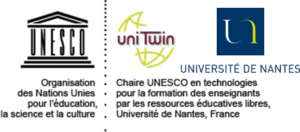 Workshop
Workshop
Workshop on Technologies for Open Educational Resources
This international workshop is part of the 3rd X5GON meeting - an EU funded project on Media Convergence, under H2020 Leadership in enabling and industrial technologies
With Open Educational Resources, opportunities for better and more exciting teaching are being made available, shared in an increasing way. In the European project X5GON we are investigating ways in which Artificial Intelligence can enhance the learning experience and how teachers can be encouraged to produce and share their lectures in the knowledge that these will be made simple to find and use by other teachers and learners.
X5GON’s position is that better technology can help build better learning and teaching experiences. We also are aware that more technologies are today being tested in labs and companies which will make education much more affordable in all senses and to all, in full compliance with UNESCO’s SDG4.
The UNESCO chair of Open Educational Resources at University of Nantes, France and the Knowledge 4 All Foundation will organize on Tuesday 16th October 2018, in Nantes (the LS2N Lab) and in the context of the European project X5-GON a one day workshop on New Technologies for Open Education.
The goal of the workshop is to allow discussion and debate between:
- Promoters and researchers developing new technologies, some of which have not been applied in education,
- Actors and decision makers from the different education organizations who will be able to describe the complex issues they see and evaluate if the proposed technologies can address these,
- Experimenters who are already trying new digital and AI inspired technologies in the field of education.
The workshop will propose talks about blockchains, hybrid social networks, inclusion, evaluation, curricula alignment, end-to-end communication, interoperability. More generally, we aim at drawing a broad picture of how technologies, and more specifically artificial intelligence, can (but obviously not on their own) help solve some of the issues facing education. Presentations and panels (in English) will take place in the Laboratoire des Sciences du Numérique de Nantes. Registration to the workshop is free but should be done well in advance: please send an email to cdlh@univ-nantes.fr and you will receive a link.
Programme
| 09:00‑09:15 | Welcome and Introduction Prof. Colin de la Higuera, UNESCO Chair in technologies for the training of teachers by OER, University Nantes |
| 09:15‑10:00 | The Semantic Web of Education
Marko Grobelnik and Mitja Jermol, Jozef Stefan Institute, Ljubljana Marko is Slovenia’s digital champion, a recognized researcher in many fields inside Artificial Intelligence and Digital Champion for Slovenia. Mitja is UNESCO OER technologies Chair and has been the founder and leader of the Open Education for a better world Mentoring Program. The Slovenian Unesco Chair puts a special emphasis on the technological aspects of Open Education. |
| 10:00‑10:45 | Thesaurus matching: a use case in e-commerce
Thomas Cerqueus, Lengow, France Lengow is concerned with proposing systems allowing retailers to efficiently propose their product on a wide variety of online merchant sites. It may be the case where the same technologies could help courseware be deployed over a variety of platforms with much less effort than today. |
| 10:45‑11:15 | Coffee brake |
| 11:15‑12:00 | How will blockchain contribute to the Open Educational World Movement?
Perrine de Coëtlogon, Blockchain & Education advisor at Université de Lille, France Perrine hosts a digital working group at national level on Blockchain and Education (Blockchain4Edu) within the directorate for pedagogical innovation of the University of Lille (France). Perrine de Coëtlogon and her colleagues envisage that in an open learning environment it will be necessary to be able to trace the different contributions to open educational resources. They aim to use a Blockchain solution for this. |
| 12:00‑12:45 | End-to-end communication tools for OER
Alfons Juan, Universidad Politecnica de Valencia, Spain Alfons is senior researcher at Universidad Politecnica of Valencia and has led his team in various European projects in which they have developed technologies to transcribe and translate scientific and educational videos. They now aim to deliver an end-to end solution, with the translation being given through voice synthesis including voice models for the original speaker. |
| 12:45‑14:15 | Lunch |
| 14:15‑15:00 | Smarter Systems Include the Margins
Jutta Treviranus, Ontario College of Art and Design University, Canada Jutta is Professor at the Ontario College of Art and Design University (OCADU) in Toronto and Founder and CEO of the Inclusive Design Research Centre at the Inclusive Design Research Centre, where proposals are being made to allow web navigation (and more specifically learning) to be more inclusive and friendly. |
| 15:00‑15:45 | Scaling our Open Education infrastructure with microservices
Samuel Paccoud, FUN, France Samuel is CTO at FUN, the main French speaking MOOC platform. His talk will be about the convergence and interoperability of online learning tools through shared formats and norms. |
| 15:45‑16:00 | Coffee brake |
| 16:00‑16:45 | Hybrid Social networks of learners
Benjamin Ninassi, INRIA, France Benjamin is Research engineer at INRIA, technical leader of the IT development team and main developer of the Class’Code Platform. The platform aims at helping teachers and educators learn to teach code through online activities and the promotion of a social network built from these activities. |
| 16:45‑17:30 | Open educational resources across the OECD, current state of play and emerging trends Mathias Bouckaert, OECD, Paris Since the Centre for Educational research and Innovation at the OECD first published its report on “Giving Knowledge for Free” in 2007, the degree of development and use of OER has significantly increased across education systems as highlighted in the report “Open Educational resources: a catalyst for innovation” (Orr et al., 2015). The presentation will place perspective in the debate by portraying those evolutions and their implications for policy. It will also feature more recent work conducted at the OECD around the topic of open higher education and its potential repercussions on selection, quality and costs. |
Co-organizer
The workshop will be co-organised by the UNESCO Chair in technologies for the training of teachers by OER at University of Nantes, France

How to get there
Arriving by plane
Check connections to Nantes on Nantes Airport website. Nantes airport is South-West of the city and you can either take a taxi or public transport into town. The airport shuttle will take about 20 minutes to reach the city centre. The shuttle bus costs 9 EUR.
Arriving by bus
The cheap alternative is to take bus 48 to the Pirmil stop where you will be able to take tram 3 to reach the city center. One normal ticket (1,60 EUR) is enough for both transport (2 EUR if you buy your ticket in the bus). More information on the Tan website (local bus network) .
Arriving by train
There are many daily trains to reach Nantes from Paris. The train station in Paris is called Montparnasse. Alternatively, there are some direct trains from Paris Charles de Gaulle airport. See times and conditions on the SNCF website.
Getting around Nantes
Use the many buses, tramways and busway. See the local map and information on the TAN website.
Accommodation
There are many hotels to choose from. We have selected the following who propose special prices to the University:
- Hotel Duquesne, 95 EUR +9 EUR for breakfast (and 0.75 EUR tourist tax)
- Hotel La Pérouse, 100 EUR including Breakfast (and 2.25 EUR tourist tax) [New prices for October have not been published yet]
- But you may use the usual tools to find a special deal. We recommend you find a hotel in the Centre of town and reasonably close from line 2 of the tram.
General information
- Detailed information on Nantes’ Tourism Office
- Visit the official website of the City of Nantes
- Read the tourist guide (pdf online)
Getting to campus
LS2N, Nantes’ research lab in digital sciences, is located at the campus of Science Faculty of the University of Nantes (called campus “Lombarderie”) in the northern part of the city center.
The campus is easily accessible by public transport:
- By tram line #2, stop at Michelet Sciences (coming from Commerce, downtown).
- By bus, with several stops located nearby: Lines #10 and #23: Michelet stop.
- You can also come by tram from the train station (North exit): Take line #1 to Commerce, then take line #2 and get off at Michelet Sciences stop.
And if it is a nice day you can even reach the campus with a very nice 30 minutes walk following the river Erdre.
Administrative address
LS2N / UFR Sciences 2 rue de la Houssiniere, building #34 44322 Nantes Cedex 3, France










